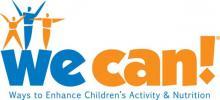
We Can! (Ways to Enhance Children's Activity & Nutrition)® is a national education program for parents, caregivers, and communities that assists children 8 to 13 years of age to obtain and maintain a healthy weight. Through national news and events, partnerships with corporations and organizations, and community action, We Can! is dedicated to helping families “eat right, get active, and reduce screen time.”1
The National Heart, Lung, and Blood Institute (NHLBI), a part of the National Institutes of Health, launched the Obesity Education Initiative (OEI) in January 1991 to reduce the prevalence of overweight, obesity, and physical inactivity. Though OEI was specifically focused on preventing coronary heart disease, it was recognized that reducing overweight and obesity would prevent or mitigate pulmonary disorders, type 2 diabetes, and sleep apnea.2
Another NHLBI program, Hearts N' Parks, also played a foundational role in the We Can! program. As a partnership between NHLBI and the National Recreation and Park Association (NRPA), this three year program promoted heart-healthy eating and utilized park and recreation settings for physical activity in both youth and adults.
Both of these programs, the OEI and the Hearts N' Parks, were reviewed at a 2004 NHLBI Strategy Development Workshop. For two days, more than 70 experts studied science literature on obesity prevention, surveyed existing and planned programs, and formed a strategic plan.3 The National Institute of Diabetes and Digestive and Kidney Diseases, the Eunice Kennedy Shriver National Institute of Child Health and Human Development, the National Cancer Institute, and the NHLBI reviewed the strategic plan, created the We Can! Program, and presented the program to the NIH Obesity Research Task Force for feedback and refinement.
Launched on June 1, 2005, We Can! is a resource for parents and families, the primary influencers on children of this age group. The program utilizes national media and resources, partnerships with corporations, organizations, and health professional associations, and four community outreach programs to promote six goals for youth:
- Choose a sufficient amount of a variety of fruits and vegetables per day.
- Decrease consumption of high-fat foods and energy-dense foods that are low in nutrient value.
- Enjoy small portions at home and at restaurants.
- Substitute water, fat-free milk, or lowfat milk for sweetened beverages.
- Engage in at least 60 minutes of moderate physical activity on most – preferably all – days of the week.
- Reduce sedentary activity by limiting screen time to no more than 2 hours per day.
The We Can! Community Outreach Program includes one adult and four children’s programs. The six week lesson plan We Can! Energize our Families: Curriculum for Parents & Caregivers is designed around five goals that echo the youth goals listed above.
The We Can! youth programs include: the CATCH Kids Club, an after school or summer program that promotes physical activity and nutrition education for children aged 5-12 years old; Media Smart Youth, which teaches the connection between media and health as well as media analysis skills for youth ages 11-13 years of age; S.M.A.R.T. (Student Media Awareness to Reduce Television), which is designed to reduce television, video, DVD, and electronic game usage among children ages 8-10 years of age; and the SPARK programs, which are designed to increase physical activity in PE and afterschool settings.4
During We Can!’s first year, the program was implemented at 14 intensive community sites from which a progress report and case studies were published. We Can! offers a general, intensive, or city/county level of involvement for parks and recreation departments, YMCAs, work sites, faith-based organizations, medical or health systems, fitness centers, universities, and schools. After five years there were 1,080 general sites, 127 intensive sites, and 18 city/county sites throughout the United States and 11 other countries.5
We Can!'s national media events have included a partnership in 2008 with the U.S. Fish and Wildlife Service and the National Park Service to promote the National Get Outdoors Day on Father's Day weekend.6 The following year they partnered with Subway® Restaurants in promoting the National P.E.P. (Play More, Eat Right, and Push Away the Screen) Rally in Washington, D.C.7 The program also offers English and Spanish materials, a parent handbook and parent-oriented website, and public service announcements.
- 1. “About We Can!” National Heart Lung and Blood Institute. < http://www.nhlbi.nih.gov/health/public/heart/obesity/wecan/about-wecan/index.htm > 8 Feb. 2012.
- 2. “We Can! Progress Report: Curriculum Implementations.” Intensive Sites. < http://www.nhlbi.nih.gov/health/public/heart/obesity/wecan/downloads/progsummary.pdf > 8 Feb. 2012.
- 3. “Background.” National Heart Lung and Blood Institute. < http://www.nhlbi.nih.gov/health/public/heart/obesity/wecan/about-wecan/background.htm > 8 Feb. 2012.
- 4. Op.cit., “We Can! Progress Report.”
- 5. “We Can! Media Kit.” National Heart Lung and Blood Institute. < http://www.nhlbi.nih.gov/health/public/heart/obesity/wecan/downloads/media-kit.pdf > 8 Feb. 2012.
- 6. “Give Dad the Gift of Good Health for Father's Day this Year.” United States Department of Health & Human Services. < http://public.nhlbi.nih.gov/newsroom/home/GetPressRelease.aspx?id=2574 > 8 Feb. 2012.
- 7. “NIH's We Can! Partners With Subway Restaurants To Expand Movement To Prevent Childhood Obesity.” U.S. Department of Health and Human Services NIH News, National Institutes of Health. < http://public.nhlbi.nih.gov/newsroom/home/GetPressRelease.aspx?id=2630 > 8 Feb. 2012.

